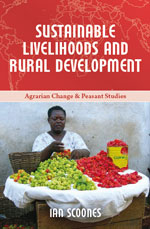Livelihoods are a vital lens on rural development, but should be examined in the context of wider questions of political economy.
A new book by STEPS director Ian Scoones looks at the relationships between livelihoods and sustainability, and proposes four elements of a new politics of livelihoods: interests, individuals, knowledge and ecology.
 Sustainable Livelihoods and Rural Development
Sustainable Livelihoods and Rural Development
by Ian Scoones
Practical Action Publishing
August 2015
Hardback: £22.46
Paperback: £9.86
Buy the book from Practical Action Publishing
(price discount for limited period)
About the book
The message of Sustainable Livelihoods and Rural Development is clear: livelihoods approaches are an essential lens on questions of rural development, but these need to be situated in a better understanding of political economy.
The book looks at the role of social institutions and the politics of policy, as well as issues of identity, gender and generation. The relationships between sustainability and livelihoods are examined, and the book situates livelihoods analysis within a wider political economy of environmental and agrarian change.
Four dimensions of a new politics of livelihoods are suggested: a politics of interests, individuals, knowledge and ecology. Together, these suggest new ways of conceptualizing rural and agrarian issues, with profound implications for both thinking and action.
Chapters
1 Livelihoods Perspectives: A Brief History
2 Livelihoods, Poverty and Wellbeing
3 Livelihoods Frameworks and Beyond
4 Access and Control: Institutions, Organizations and Policy Processes
5 Livelihoods, the Environment and Sustainability
6 Livelihoods and Political Economy
7 Asking the Right Questions: An Extended Livelihoods Approach
8 Methods for Livelihoods Analysis
9 Bringing Politics Back In: New Challenges for Livelihoods Perspectives
Endorsements
‘This is an extraordinarily important book. It should become a classic. It is a must for every development professional. It is a masterly analysis and overview of the evolution and dimensions of the sustainable livelihoods approach, and opens up new territory of political economy, political ecology and a new politics of livelihoods. Concise yet comprehensive, combining and drawing on the perspectives of many disciplines, accessible to all readers, professionally impeccable, and on top of all this, original in its analysis and extension into new fields, this book is a wonderful contribution to development thinking and action. May it be very widely read, and may it be very influential.’
Robert Chambers, Institute of Development Studies, University of Sussex
‘In this uniquely comprehensive, lucid and valuable review of notions of sustainable livelihoods and their applications, Ian Scoones makes a potent argument for reinstating an expansive perspective on livelihoods, informed by the political economy of agrarian change, at the centre of current concerns with overcoming rural inequality and poverty.’
Henry Bernstein, School of Oriental and African Studies, University of London
‘Ian Scoones has produced a book that is in perfect balance: immensely useful, it is also challenging; theoretically perceptive, it is wonderfully readable; historically informed, it also looks forward, proposing agendas for scholars and professionals alike. Students and practitioners will find it invaluable because it places livelihood thinking in context, explores its applications, explains its limits and — perhaps most important of all — persuades the reader that being political and being practical are absolutely not mutually exclusive options in development, whether writing about it or working within it.’
Anthony Bebbington, Graduate School of Geography, Clark University and idpm, University of Manchester
‘This book offers a sanguine assessment of the strengths and weaknesses of a sustainable livelihoods approach. The proposed extension of the approach builds on a political economy tradition in agrarian and development studies. Nurturing sustainable livelihoods for the poor is not just about recognizing their exceptional skill at making a living, which includes diversifying livelihoods, jumping scales and nesting home places within productive networks, but also mitigating their vulnerability to land grabs, drought and floods, natural disasters, corporate greed and venal politics.’
Simon Batterbury, University of Melbourne
Buy the book from Practical Action Publishing (price discount for limited period)
My name is Milkessa Shafe from Addis Ababa University of Ethiopia
Currently I was undertaking thesis work for my MA program in Rural development.
I need this book badly. However I don’t have the capacity to afford it. Please would you help me!
Sir,
may I get a specimen copy of the book titled as Sustainable Livelihoods and Rural Development.
Reards